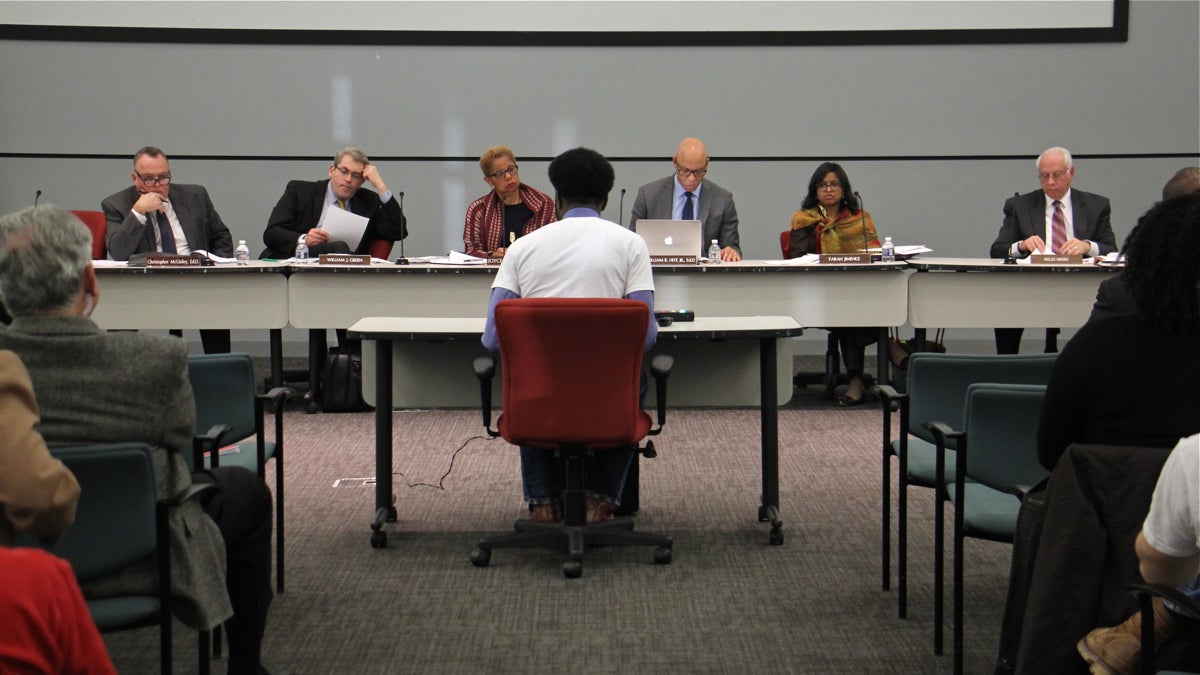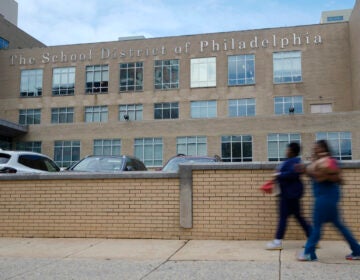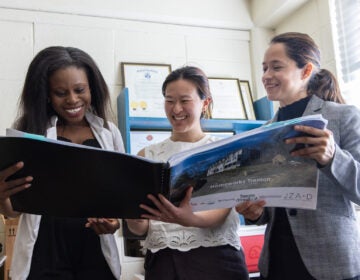Philly approves one new charter school, rejects another two

Kileeo Wideman testifies on behalf of Deep Roots Charter School before the Philadelphia School Reform Commission
In what was a slow year for applications, Philadelphia’s School Reform Commission approved one new charter and rejected two others Wednesday night.
The sole approval went to KIPP Parkside, which will become seventh school under the KIPP Philadelphia umbrella when it opens in 2019. The SRC rejected applications for Friendship Whittier Charter School and Deep Roots Charter School.
The district received just five applications for new charter schools this year; two were withdrawn prior to final deliberations.
The SRC approved KIPP’s application with conditions, one of which was that it delay opening the Parkside school until 2019. The SRC also mandated that KIPP Parkside open as a K-4 school rather than a K-8. SRC members said they were concerned about KIPP’s past performance in the middle grades and stipulated that the school could expand grades if performance improved.
“It seems to me in some ways this was asking us to make a bet on our educators that we can get our game up in our middle grades,” said KIPP Philadelphia CEO Marc Mannella. “And I’m willing to make that bet 10 times out of 10.”
KIPP leaders were not aware heading into the evening that the SRC would delay the school’s opening, Mannella said, adding that the arrangement wasn’t ideal. But, he added, he was “elated” for the families on KIPP’s 3,700-student wait list who might now have an option to attend KIPP.
The SRC approved KIPP Parkside’s modified application unanimously. Three of four commissioners voted to deny the other two applications. Only Commissioner Bill Green voted to approve all three charter schools.
Typically the SRC has five members, but is down to four at the moment because Gov. Tom Wolf’s nominee for the commission, Estelle Richman, is awaiting a confirmation vote from the state Senate.
Wednesday’s SRC meeting was notable, in part, because it was the first time chair Joyce Wilkerson and Commissioner Christopher McGinley deliberated publicly on new charter applications.
Those seeking to get a read on how this new incarnation of the SRC will view charters, however, might have come away disappointed as Wilkerson, McGinley, and Farah Jimenez all voted the same.
“It’s become an increasingly complicated call,” said Wilkerson of her first time reviewing new applications. “That’s probably what I’ve learned more than anything else.”
Wilkerson said there were “glaring concerns” with the applications for Deep Roots and Friendship Whittier.
She said Deep Roots’ application was thin on how it would teach English language learners, an acute concern given that the school wanted to open in the heavily Hispanic Kensington neighborhood. Jimenez worried about the school’s financial stability. She noted that changes in state funding can warp charter school budgets and that schools must be on solid footing to survive these swings of fortune.
Wilkerson called the Friendship Whittier application “simply not ready.” A review from the SRC’s Charter School Office noted that parts of the Friendship Whittier application conflicted with Pennsylvania law and that the school had yet to lock down a location.
Green encouraged both rejected schools to return in future years, saying the district needed outside applications to help diversify the city’s charter sector. Since reopening its application process in 2014-15, the SRC has only approved new schools submitted by providers who already have a foothold in the city. No outside organizations have been able to break through.
Too many charters or not enough?
The low number of applications and approvals this year has raised alarm bells among some school-choice advocates. After Wednesday’s vote — which paves the way for, at most, 860 new charter seats — Mike Wang of Philadelphia Advocacy Advocacy Partnerships blasted the commission.
He accused the SRC of rejecting solid applicants and consigning children to neighborhood schools with poor academic outcomes.
“The SRC demonstrated once again it can’t help but put politics ahead of equity,” Wang wrote in a statement.
Wang and other advocates have repeatedly accused the SRC of nitpicking charter applications and turning down a disproportionate share of them as a way to stabilize the district’s bottom line. A 2012 report from the Boston Consulting Group estimated that the district loses $7,000 for every new charter seat created. Those “stranded costs” result from the fact that when students move to charters the district must continue to pay for administrative and capital costs at the buildings they leave behind.
Some, however, have questioned whether the $7,000 figure is accurate. In 2015, the district commissioned a study to re-examine the issue, but the final report has not been released
“Some drafts are going back and forth, making sure that the consultant group examined all the pieces,” said Uri Monson, the district’s chief financial officer.
The debate over whether charter expansion damages district schools — and if so, to what extent — continues. Multiple speakers raised the issue at Wednesday’s meeting.
“The SRC must not approve any more charters,” said Lisa Haver, with the Alliance for Philadelphia Public Schools. “We simply cannot afford them.”
Though the prospects for significant charter expansion were slim Wednesday due to few applications, the SRC could still green-light significant growth later this year when it considers charter renewals.
When charters apply for renewals they can also apply for expansion. The SRC’s charter office has subtly encouraged existing to charters to go through the expansion process rather than apply for new schools.
Twenty-five charters are up for renewal this year, and the Charter School Office is due to release its renewal recommendations by March.
Jimenez voted on the KIPP Parkside application even though in the past she has abstained from voting on KIPP-related matters due to a perceived conflict of interest. Jimenez explained that her husband’s law firm no longer works for KIPP and thus she is free to vote on issues related to the charter network.
WHYY is your source for fact-based, in-depth journalism and information. As a nonprofit organization, we rely on financial support from readers like you. Please give today.





